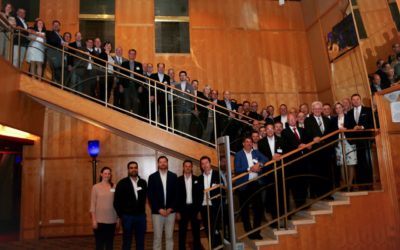- Expectations often too high – „Magic out of the box“ does not exist
- Having data and having usable data are completely different things
- Participants, necessary process changes and the redefinition of responsibilities are massively underestimated
- Only holistic project planning and support ensures project success
You can’t do magic – mathematics is also just a natural science
Many medium-sized companies from traditional industries are currently engaged in projects to digitize their products and services. The core competence of the acting persons lies classically in other areas and so modern „magicians“ are often invited to help without complications and pain.
Terms such as Artificial Intelligence (AI), neural networks, Internet of Things (IoT) and so on are advertised to the potential customer and the provider with the most convincing „bullshit bingo“ wins the contract! In this context, an English aphorism that is not entirely serious comes to my mind, which aptly describes the situation as follows:
Unfortunately, in practice it still happens time and again that the sober description of the statistical-mathematical methods used does not seem sophisticated enough for the technology believer. Sometimes one expects real miracles, which one alone would not have thought of. For the sake of fairness, it must be said that there are certainly areas in which the algorithms „see“ more than people. The in places very bad data situation in the German middle class provides for the fact that this is hardly to be found in practice and one must consider which questions can be placed at all and how the data quantity can be enriched as fast as possible, so that usable data can be developed.
Nevertheless, it seems that people are more receptive when simple answers are given to complex problems. So marketing is everything here too!
Mathematics solves problems, but is not a selling point
Data – the oil of the future or „shit in = shit out“
When you come to a new customer as part of a digitization job, it often means „We have all the data! The statement is superficially correct. However, if you then follow the entire process chain, you will find data in many different forms:
- Machine data (raw data)
- Preprocessed machine data (averaged values)
- Data from ERP, MES, SCADA systems
- Excel-Tables
- Own formats
- Notes in continuous text (electronic)
- Handwritten slips of paper (e.g. shift book)
- Information given orally
These data are then usually still stored at different intervals. This can lead to evaluation problems if, for example, data from source X, which stores a characteristic value every minute, has to be compared with data from source Y, which does so every millisecond. It is very likely that the reference value is missing in most places. For this purpose, solutions must be found which then determine it mathematically – with all the inaccuracies that can arise here.
Another challenge is the harmonization of data formats. As long as one moves in the environment of electronically available data, solutions can still be found here relatively easily. It always becomes difficult when recordings that are understandable to humans, such as continuous text, must be converted into a format that can be evaluated by computers. While a human being has the gift of the ability to make decisions and the possibility of being able to draw on his experience or even gut feeling in the case of unclear questions, processors need clearly defined codes for classification.
The main challenge is therefore to identify and eliminate these potential stumbling blocks in advance of the digitization project.
Even if this has happened so far, there are sometimes examples in practice that show that the business processes can properly counteract the project goal. Not so long ago, one of our customers set the goal to find out which process parameters lead to bad parts in production. A good example of the benefits of data evaluation. Unfortunately, the part numbers of the rejects were not noted down and the reason for rejection was not recorded. This clearly shows that even if all the necessary process parameters are present, no statement can be made about the causes of quality defects.
Because too little or too bad data does not lead to the goal.
Algorithms do not solve organizational problems
Up to now, digitalization projects in companies have focused disproportionately on the technical implementation and the algorithms used. The probably most important factor critical to success – the human being – is often overlooked.
In addition to the methodological and technical obstacles described at the beginning, many procedures in the company must be looked at, processes evaluated and often changed. Digitalization projects therefore require people from different areas of the company who would not normally work together in this way.
This can be both a curse and a blessing. Blessing by creating a completely new and holistic view of the company through departments and divisions. Curse, because, in order to implement changes promptly, suddenly decision makers on the highest level are needed, who, as experience shows, do not see themselves in the lowlands of project work.
The set-up of the project group should therefore be done in advance by people who have already gained experience in interdisciplinary projects. The binding support of the top management is also indispensable to bring about the necessary organizational changes, even at short notice, but also to cooperate operationally at one point or another. This also applies to the representatives of the employee co-determination.
A good group is formed by the following people:
- Responsible people in the company
- Technologists from the production
- Responsible people from quality and process management
- Responsible for the ERP system
- Responsible for shop floor IT
- Responsible for corporate IT
- Responsible for IT security
- Management and co-determination
- Mid-level Management
- Top Management
- Works Council
- Experienced project partner
- With profound technical knowledge
- With experience in the field of digitization projects
- With experience and management and process consulting
- Which also offers sustainable project management
When you consider the number of departments and people involved, it quickly becomes clear that the external, but above all the internal project efforts should by no means be underestimated.
In particular due to the necessity of process changes, also across the entire value chain if necessary, the speed of implementation and thus the cost risk does not depend on the technical realization but on the ability of the company to design change processes.
The commitment of top management is essential for the success of the project, because short-term decisions must also be implemented promptly.
A good plan is an advantage – Digital Success Road Map
The problems and challenges described so far are not isolated cases. Even larger companies with regulated project management are not immune to mistakes in handling digitalization projects.
The success of the project depends largely on the human component. Thus an often tough struggle for responsibilities and authority is the order of the day. Only the necessary openness among each other and a collegial cooperation lead to results.
An approach developed from software development – the Digital Success Road – takes into account all the critical facets of a digitalization project. Good planning is the be-all and end-all, the smoothest possible implementation guarantees success. After all, implemented digitalization projects are often an important driver for achieving strategic corporate goals – the strengths the resilience of companies in volatile markets and create the decisive competitive advantage.
Pure IT consulting without accompanying strategy and process consulting with close project support does not lead to the desired goal.
oeconos GmbH – Business Development
We, the
Numerous projects during the introduction of Industry 4.0 solutions at our customers have shown that the technical implementation is an important factor, but not the only critical success factor of the project. The existing business processes and their adaptation to the digital environment in the company are equally important for a functioning, sustainable business model.


